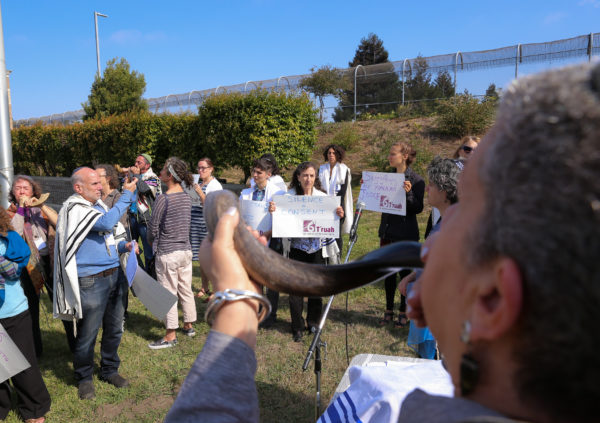My community in Boston, Nehar Shalom Community Synagogue, is part of a sanctuary cluster of six houses of worship—three Christian, three Jewish—supporting a man lacking immigration status who is currently a guest in one of the churches.
I had the privilege to speak at a Sanctuary press conference during the deeply reflective days of turning between Rosh Hashanah and Yom Kippur, to announce the presence of this holy guest in a house of God. As we now approach Sukkos, I think of him as one of the ushpizin, the holy guests whom we invite into the sukkah, offering welcome and shelter at our table. I did not expect to be called as the first speaker, thinking I had time to gather my thoughts. Instead, as I stepped to the podium, feelings gushed out, raw and immediate. “We are gathered here in love,” I nearly cried, filled with emotion. “We are here in love for those in need, for our guest now separated from his family, for all of those demeaned and denied. We are here in love so deep that it also includes those who oppose us, reaching out to them as human beings. Our love for humanity includes all people, each one created in the image of God. Bearing the image of God, no human being is illegal.” To someday create of this world a sukkat shalom, a sukkah of peace, we will all need to dwell together.
Our love for each other is a reflection, or perhaps a refraction, of God’s love, which on Sukkot we experience through the protection—ephemeral though it may seem—of the sukkah, so fragile and so strong, reminding us to have faith that we can get there and yet create the sukkat shalom. The Shnei Luchot HaBrit, Rabbi Isaiah Horowitz of Prague, teaches that we celebrate Sukkot at harvest-time, after gathering in all the blessings of the past year, reminding us that in all our grandeur and fragility, we depend on God and on each other to make the journey. And as Sukkot comes to a close, we start to pray for rain, which to our ancestors in Israel was very much a sign of God’s love. In these times of such terrible storms, reflecting earth’s sickness and pain at our hands, we pray for rain that nurtures and fructifies and does not destroy. Dwelling in our own simple sukkas, we promise greater care and love for the fragile sukkah of earth.
As we enter this next phase of our holiday season, may our love overflow (leave out-and spread outwards) to touch all those in need of shelter, bringing healing to all people, together upon this earth in sanctuary.

